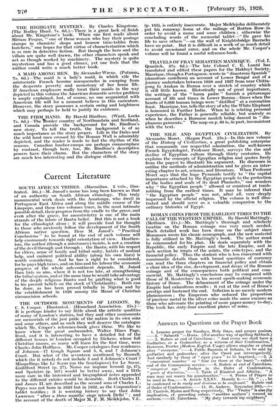Current Literature
SOUTH AFRICAN TRIBES. (Macmillan. 2 vols., illus- trated. 50s.)—M. Junod's name has long been known as that of an authority on South African ethnology. This truly monumental work deals with the Amatouga, who dwell in PortugueSe East Africa and along the middle course of the Limpopo, and these two volumes trace, in the most intimate possible detail, their progress from the cradle to the grave, and even after the grave, for ancestrolatry is one of the main strands of the fabric of Bantu belief. But this is not a book for the ethnologist alone : it will proVide food for thought to those who anxiously follow the development of the South African native question. Here M. Junod's " Practical Conclusions " to be found at the end of each volume will help enormously towards right orientation of view. Heathen- ism, the author (though a missionary) insists, is not a creation of the devil through and through ; the Bantu, with his respect for elders, sense of family and tribal unity, habits of mutual help, and eminent political ability (along his own lines) is worth considering. And he has a right to be considered, for he paysihigh taxes, and on him and his labour the econornie progress of the whole sub-continent depends. M. Junod then bids us aim, where it is not too late, at strengthening the tribal system, and at the same time he irould take advantage of the deeply religious Bantu soul by grafting what is good in his present beliefs on the stock of Christianity. Both can be done, as has been proved tribally in Nigeria and by the • establishment in 1926 among the Masai of Christian
circumcision schools. -








































 Previous page
Previous page